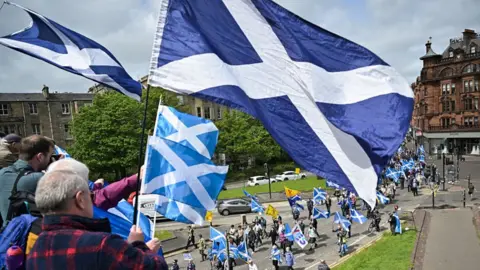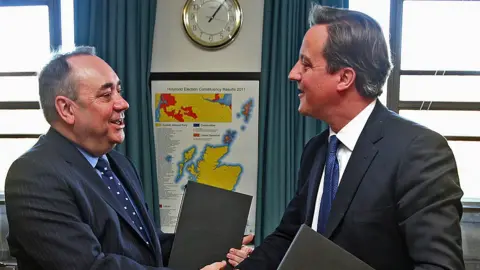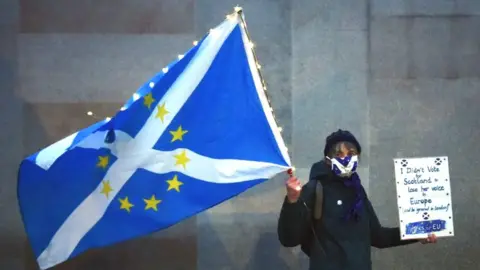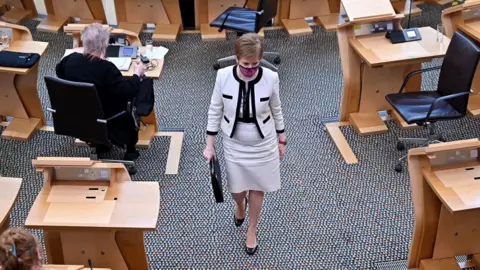Scottish independence: Is there a mandate for another referendum?
 Getty Images
Getty ImagesNicola Sturgeon has told MSPs how she plans to hold a second referendum on Scottish independence, regardless of whether or not the UK government grants formal consent.
UK ministers have already indicated they will not do this.
So, what are the arguments for and against another vote?

There are more MSPs at Holyrood who support another independence referendum than there are against it.
Together the SNP and the Greens won 72 of the 129 available seats.
That majority - elected having made their indyref2 positions clear - is what Nicola Sturgeon has described as a "cast iron democratic mandate".
What she does not have is the explicit legal power to hold a vote on Scotland's relationship with the UK - in or out of the 315-year-old union.
That's because the law setting up the Scottish Parliament specifically reserved decision-making over that part of the UK constitution to Westminster.
That complicates and potentially trumps any mandate for a referendum.
While some lawyers argue that it should be possible for Holyrood to hold a consultative ballot because the result would not be legally binding, others maintain that a Yes vote would undermine the union by creating the expectation of change.
That would be for judges to decide.
 Getty Images
Getty ImagesThe way this tension was overcome for the 2014 referendum was by agreement between the Scottish and UK governments.
The then prime minister, David Cameron, accepted that first minister at the time, Alex Salmond, had a mandate to ask voters if they would like independence.
The Oxford Languages definition of a mandate is: "the authority to carry out a policy, regarded as given by the electorate to a party or candidate that wins the election".
Mr Salmond and the SNP won a majority of the seats in the Scottish Parliament - 69 of 129 - under a proportional voting system designed to avoid any one party dominating.
The SNP had promised a referendum in their manifesto.
Westminster temporarily transferred powers to Holyrood, through what's known as a section 30 order, to allow MSPs to legislate for a referendum that was beyond legal challenge.
That was then. The political mood is very different now. Not least because there has been a referendum, which was billed at the time as a "once in a generation" decision.
Nicola Sturgeon and others on the Yes side repeated that "once in a generation" line throughout the 2014 campaign.
I can also remember Alex Salmond explaining that the 17-18 year gaps between the Scottish constitutional referendums in 1979, 1997 and 2014 was what he meant by a generation.
 Getty Images
Getty ImagesIt can also be argued that Brexit fundamentally alters the circumstances in which that proposition was advanced - that it has been overtaken by events.
As prime minister, Boris Johnson's view is that with a cost of living crisis and Covid recovery to deal with, "now is not the time" to revisit the independence question.
Nicola Sturgeon thinks doing so is essential to allow Scotland to shape its own recovery.
While Scottish Secretary Alister Jack has said any request for another section 30 would be discussed, he's made pretty clear the answer would be "no".
He has also rejected the idea that by refusing to co-operate the UK government would be denying democracy. "I don't accept there's a mandate at all," he said.
Mr Jack points out that, unlike 2011, the SNP did not win a majority of seats at Holyrood on their own. They were one short, with their total topped up by the Greens.
Some who oppose indyref2 argue that the SNP - or perhaps the Yes side more generally - should also need to win a majority of the votes in the election.
The SNP, Greens and Alba achieved that in the regional list ballot in 2021 but were outperformed in the constituency vote across Scotland by pro-UK parties, who consider that a mandate to resist indyref2.
The Scottish secretary has even suggested that a majority of the electorate (not just those who actually vote) should be required. That would be a very high bar.
The counter argument to all this is that the SNP and Greens have more seats and votes now than they had in 2011 and that therefore the mandate is stronger.
Legal clout
Nicola Sturgeon has accused those who do not accept this of taking a "wrecking ball" to the idea of the UK as a voluntary partnership.
To recap. One side thinks there is "cast-iron" authority for indyref2 while the other thinks it's non-existent. It may seem mind boggling that such difference is even possible.
The problem, according to Chris Carman, a professor of citizenship at Glasgow University, is that "there is no objective, independent benchmark on which to base claims of a mandate".
If vote strength is considered key, politics professor Sir John Curtice of Strathclyde University argues that Nicola Sturgeon got "at least as strong or equally arguably as weak a mandate as the one Boris Johnson secured in December 2019 to deliver Brexit".
In other words, Yes parties got roughly the same share of the vote in the constituency ballot at Holyrood in 2021 as Leave parties did in the Westminster election of 2019.
The difference is that Holyrood does not necessarily have the legal clout to deliver what Nicola Sturgeon promised.
 Getty Images
Getty ImagesThe Scottish election study, carried out after the 2021 Holyrood election, suggests a majority of Scottish voters consider the outcome as a mandate for indyref2.
That remains the case even when it is made clear the SNP did not win a majority of seats.
However, more recent opinion polling suggests there may be limited public appetite for indyref2 being held before the end of 2023 as the Scottish government proposes.
The debate is deadlocked with some suggesting there needs to be a Canada-style Clarity Act setting out the democratic route to independence.
Without that or some other agreement between the two sides, it may be that the UK government has, in effect, a veto over Scottish government plans for indyref2.
Nicola Sturgeon is determined to ensure that is not the case and set out her plans to bring about another referendum at Holyrood on Tuesday.
By holding the line, Boris Johnson may hope that the Scottish public tire of constitutional politics and that the independence question fades in importance.
It is also possible that UK resistance increases support for independence to levels that are harder to resist. That at least will be the aim of the indyref2 campaign that Nicola Sturgeon has started.
